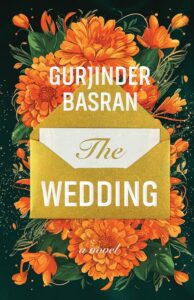What’s love got to do with it?
The Wedding
by Gurjinder Basran
Madeira Park: Douglas & McIntyre, 2024
$24.95 / 9781771624169
Reviewed by Bill Paul
*

In the novel, The Wedding, Devinder “Devi” Dosanjh and her groom, Nanak “Baby” Atwal are planning to marry at the Nanaksar Gurdwara Gursikh Temple in Vancouver that’s been decorated to resemble an old Bollywood film set. Yet Devinder and Nanak are not sure if becoming a couple is the right decision for them at this point in their lives. Are they too young? Are they ready for marriage? Each is hoping that the other person is maybe, possibly, their true companion for life and that the relationship, following in the tradition of a Sikh marriage ceremony, will become a blissful union.
The uncertainty and tension that both Devinder and Nanak are experiencing is also being felt by members from both families who harbour feelings of jealousy and resentment towards one another. North Delta author Gurjinder Basan (Help! I’m Alive!) has written an intricate story about fractured family relationships and how aspirations differ with each generation in Sikh-Canadian culture. Devinder and Nanak are surrounded by well-meaning, doting parents and match-making aunties. The result is a chaotic, soul-baring, multi-generational family drama.
The two families are from similar social backgrounds. Devinder’s family runs an extremely successful blueberry farm. For the past eighteen months, she’s been planning an extravagant wedding reception featuring Rolls-Royce limousines and a bhangra flash mob. Equipped with a business degree and fluent in social media, she’s given some thought to becoming an influencer. A rumour has surfaced that recently she slept with a former flame from high school. Does this mean that she doesn’t care for Nanak? Will she be filled with regrets if she lets him get away?
Nanak likes to remember back when life wasn’t so complicated. He’s nostalgic about the past when his family ran a modest sweet shop business. He has an older brother, Gobind, and at age 27, Nanak, has just finished medical school. His brother is paralyzed and confined to a wheelchair due to a shooting incident at a local bar. The two brothers are friends with Jesse, a gang member, and the story is that the bullet that fell Gobind was meant for Jesse. Satnam, Gobind and Nanak’s father, has never forgiven Jesse for his lack of remorse.
As the wedding date grows nearer, family members and friends become introspective, offering advice and support to the couple. Since his son’s shooting incident, Satnam prays regularly. He loves his two sons dearly and despite having to drive a taxi to support his family’s cost of the wedding (around two hundred fifty thousand dollars), he reminds himself to be grateful for his life in Canada. Devinder’s mother, Ramandeep, remembers living in an unhappy, arranged marriage for many years and now she hopes her daughter has the “freedom to make her choices.”
Jasvir is Devinder’s great-aunt. Like Ramandeep, Jasvir carries regrets—such as “Why she had never paused to see the world around her?”— from the past. Having tea with Devinder’s paternal grandmother, Darshan, Jasvir wonders to herself if women are genetically programmed to “make comfort where there was none.” Unlike Jasvir, Sonia, a long-time family friend of the Attwal’s, has made peace with her past. Though she has lived a trying life, she is positive about the future. She’s a level-headed, liberated young woman. A sympathetic character who seems to know what she wants out of life.

Throughout the book, Basran focuses on the stories of different female family members. We hear about the lives of aunts and cousins and the struggles of Nanak’s mother and Devinder’s mother. What were these women’s lives like when they first moved to Canada? Were their marriages fulfilling? Jasvir reflects on her marriage and her life now and tells herself that she doesn’t want to be treated like a “burdensome adult-child” by members of her family. She ponders the question and asks: “Can any woman just be, or does every woman always have to be something to someone else?”
Thinking back on her family life, Balbir, wife of Satnam, reflects on how her family’s life changed after her son Gobind was shot. It was a life-altering accident that affected the family in more ways than one. All of a sudden the future felt “shapeless.” With Balbir’s hard work and resourcefulness the family carried on and made it through the hard times. The author writes: “She built up their business so that they could afford all that they needed, and now here they were on the eve of Baby’s wedding, at what felt like a new beginning for all of them.”
Devinder and Nanak dream of a love marriage. This dream of theirs is carried by the hope and optimism of parents and aunties. A generation that resettled in Canada and believed in a life, as Satnam puts it, where “everything was possible.” Basran’s novel manages to be a commentary on the pressures and challenges faced by young couples in finding the right partner and in carrying the weight of family expectations. Devinder and Nanak may not know it but what is at stake is family honour.
In a scene near the end of the book Darshan tracks down Devinder eating an Egg McMuffin at McDonald’s. Devinder has retreated. She needs to sort herself out. Darshan understands Devinder’s ambivalence and her wish not to repeat her mother’s mistake. Darshan tells her that she will be free of the past and that she will be able to make her own happiness. Of course it’s an empty promise that cannot be kept. The past will always be a part of these character’s lives. Yet Darshan’s promise fits into the pageant and ceremony of Devinder and Nanak’s fairy tale wedding—
As the crowd gathered, the dhol drums grew louder, signaling the groom’s approach. Devi’s bridesmaids surrounded the limousines and whisked her away while Darshan joined the others to witness the baraat that had just turned the corner. Two drummers dressed in red and gold achkans led the procession, followed by trumpeters and chimta players. Baby—with his red turban, embroidered sherwani and tidy beard—looked princely riding through the crowd (on a white horse) as his family danced around him.
[Editor’s note: Gurjinder Basran will read at Vancouver Public Library, alongside S.C. Lalli, on October 2, 7-8pm.]
*
East Vancouverite Bill Paul enjoys photography and reading fiction and nonfiction. [Editor’s note: Bill Paul has reviewed books by Caroline Adderson, William Deverell, Deryn Collier, Jann Everard, Jack Lowe-Carbell, Martin West, Dietrich Kalteis, Suzannah Showler, Curtis LeBlanc, Patrick deWitt, Barbara Fradkin, Dietrich Kalteis, Stan Rogal, Keath Fraser, and John Farrow, and contributed a photo-essay, Trevor Martin’s Vancouver, to BCR.]
*
The British Columbia Review
Interim Editors, 2023-25: Trevor Marc Hughes (non-fiction), Brett Josef Grubisic (fiction and poetry)
Publisher: Richard Mackie
Formerly The Ormsby Review, The British Columbia Review is an online book review and journal service for BC writers and readers. The Advisory Board now consists of Jean Barman, Wade Davis, Robin Fisher, Barry Gough, Hugh Johnston, Kathy Mezei, Patricia Roy, Maria Tippett, and Graeme Wynn. Provincial Government Patron (since September 2018): Creative BC. Honorary Patron: Yosef Wosk. Scholarly Patron: SFU Graduate Liberal Studies. The British Columbia Review was founded in 2016 by Richard Mackie and Alan Twigg.
“Only connect.” – E.M. Forster